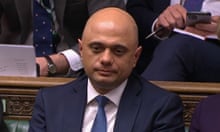The author of a groundbreaking report on the economic impact of climate change has called on Rishi Sunak to spend more than £8bn in his first budget next week to kickstart a “massive and long-term” boost to “zero-carbon infrastructure, new skills and sustainable innovation”.
Lord Stern said the new chancellor had a unique opportunity to address regional inequalities and invest to meet the government’s target for net-zero emissions with measures already highlighted in the Conservative party manifesto.
Stern, who runs the London School of Economics’ Grantham Research Institute on Climate Change, told Sunak to focus his efforts on sectors that are “difficult to decarbonise”, such as transport, property and industry.
Sunak is known to be hurriedly rewriting his budget speech for 11 March and earmarking funds to tackle the coronavirus outbreak, possibly delaying measures to improve the UK’s infrastructure.
But he is expected to signal extra spending in the regions over the life of the parliament to 2024, to support Britain reaching net-zero carbon emissions by 2050.
The report recommends the government use £6.3bn committed for energy efficiency in the 2019 election manifesto to reduce energy waste in buildings, which are responsible for 17% of the UK’s greenhouse gas emissions.
It also recommends that £1bn committed in the manifesto for vehicle charging points should be focused on rural parts of the UK that would otherwise miss out on the electric car revolution.
Stern said £800m promised to limit emissions through initiatives to capture carbon and store it should be used as an incentive to generate private sector investment.
“The budget should mark the start of a decade of massive investment in accelerating the transition of the UK economy to zero-carbon growth,” said Stern, whose report for former chancellor Gordon Brown in 2005 was one of the first to show the economic challenges from climate change and how they could be met in the UK and globally.
“This would mean that by 2030 the UK could have higher living standards, and better health and wellbeing, underpinned by UK businesses innovating and adopting cutting-edge zero-carbon technologies and practices fit for the mid-21st century,” he added.
Stern’s warning against inaction by the Treasury came as 101 climate campaigners and former government and Bank of England advisers wrote to the incoming central bank boss, Andrew Bailey, urging him to force firms to disclose their climate risks “as soon possible”.
The central bank should also exclude fossil fuel assets from both future rounds of quantitative easing (QE) and the assets the Bank accepts as collateral, so as to “lead by example”.
An earlier report by the Grantham Institute found that the bank’s £10bn purchases of corporate bonds, part of a £435bn stimulus programme, was heavily skewed towards oil and gas companies.
Among the 101 signatories were Sir David King, a former government chief scientific adviser, ex-Citigroup chief economist and former Bank of England monetary policy committee member Willem Buiter and primatologist Jane Goodall.
The signatories said they wanted Bailey to recognise the severity of the climate emergency by going beyond the initiatives put in place by his predecessor Mark Carney.
Fran Boait, executive director of Positive Money, one of the sponsors of the letter, said: “The investments made by our financial system today determine whether we will be able to keep global temperature rises below the 1.5C upper safe limit. Finance is currently funding warming of more than 4C, which represents an existential threat not only to finance and the economy, but to life on earth.
“With less than a decade to drastically cut emissions and avoid irreversible climate breakdown, Andrew Bailey must ensure that climate remains high on the Bank’s agenda. These steps are a necessary starting point.”










